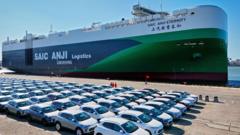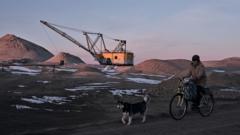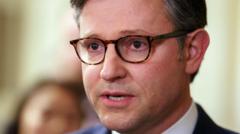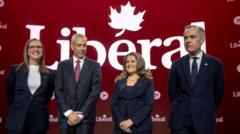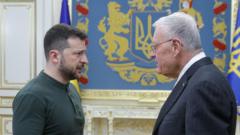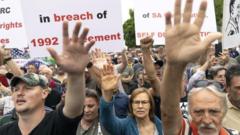As the far-right AfD party edges closer to becoming Germany's second largest political force, questions arise about the implications for both domestic and European stability amidst an ongoing economic and societal crisis.**
AfD on the Rise: A Possible Shift in Germany's Political Landscape**

AfD on the Rise: A Possible Shift in Germany's Political Landscape**
With Sunday’s elections looming, the Alternative for Germany party gains momentum, prompting concern over the future of Germany's political order.**
A political tempest is brewing in Germany as the far-right nationalist party, Alternative for Germany (AfD), appears poised for a significant breakthrough in the upcoming elections. Labeled as "radical," "racist," and "anti-democratic" by opponents, the AfD is expected to emerge as the second-largest political force, reflecting a potential seismic shift not only within Germany but across Europe.
The appeal of the AfD lies in its alignment with other populist right-wing movements across Europe, notably drawing inspiration from figures like Donald Trump. With an agenda focused on anti-immigration, skepticism towards Ukraine support, and a conservative view on energy, the AfD has garnered growing support. This resurgence is particularly concerning given Germany's historical landscape and its crucial role as Europe's largest economy.
Germany has long been viewed through a lens of dependability and influence, rooted in its post-war liberal ideals. However, recent economic challenges—exposed weaknesses in its reliance on traditional industries and dependency on foreign energy—have led to a perception of a nation now grappling with an identity crisis. Reports of crumbling infrastructure and a military lacking readiness further compound this precarious situation, leaving many citizens disenchanted and searching for change.
The current government, led by Chancellor Olaf Scholz, is struggling to navigate these treacherous waters. Economic slowdowns and public sentiments fueled by migration debates have prompted traditional parties to adopt rhetoric that mirrors far-right positions—a troubling intersection of fear and opportunism.
Moreover, the AfD's stance on immigration resonates with portions of the electorate still processing the aftermath of the migration crisis in 2015. While the party denies any intent of racism and insists on a lawful and respectful migration process, allegations persist regarding their underlying discriminative sentiments toward those with migrant backgrounds.
As the nation approaches these pivotal elections, the long-held political consensus designed to marginalize extremist elements faces a daunting test. The prospect of the AfD gaining substantial representation in parliament challenges the political framework established post-World War II, one built on ensuring no singular party could monopolize power as the Nazis once did.
Despite expectations of significant support, it remains uncertain whether the AfD can transition from a strong opposition force to an influential player in the governing coalition. The political environment in Germany is anticipated to evolve, but the fear of the extreme right gaining influence persists among many citizens who worry for the future of their democracy.
In a tumultuous landscape marked by public protests and warnings from traditional parties, one thing is clear: The upcoming elections will not only define Germany’s political trajectory but may also reverberate across Europe, changing its political landscape for years to come.




